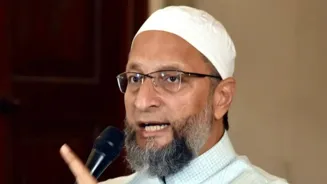AIMIM chief Asaduddin Owaisi on Monday said the Supreme Court's interim order on the Waqf (Amendment) Act, 2025, would not be enough to safeguard waqf
properties. He urged the court to deliver its final ruling on the validity of the legislation at the earliest. Owaisi said the arguments raised by petitioners challenging the Act remain "very strong" and would be presented in detail when the bench considers whether the law is unconstitutional. He stressed that the order issued on Monday was only interim in nature and offered little practical relief. "In my view and my party's view, the interim order will not protect waqf properties from the law the Modi government has made," he told reporters in Hyderabad. "Encroachers will be rewarded and there will be no development of waqf properties. That is why we hope the Supreme Court makes a final decision as soon as possible," he added. The Hyderabad MP alleged that the BJP's intent behind passing the law was to weaken the waqf system itself. He said the ruling party wanted to discourage people from dedicating property as waqf. Without naming anyone, he also claimed an amendment excluding trusts from the definition of waqf was made to protect an individual who had built a mansion on an orphanage land. Owaisi also criticised Prime Minister Narendra Modi's visit to Seemanchal in Bihar earlier in the day. He alleged the BJP had deliberately kept the region backward, even as Modi spoke of demographic changes there. Owaisi questioned why the government was not completing development projects such as strengthening the Aligarh Muslim University centre in Kishanganj. On the India-Pakistan Asia Cup cricket match, Owaisi said he wanted India to win "everywhere". However, he added that sporting ties could not be separated from national security concerns in the wake of terror attacks like the one in Pahalgam earlier this year. On Monday, the Supreme Court put on hold some provisions of the Waqf (Amendment) Act, including one requiring a person to have practiced Islam for at least five years before creating waqf. But the bench, led by Chief Justice BR Gavai, refused to stay the entire law, noting that the presumption of constitutionality remains unless a statute is proven invalid in the "rarest of rare" cases.
















